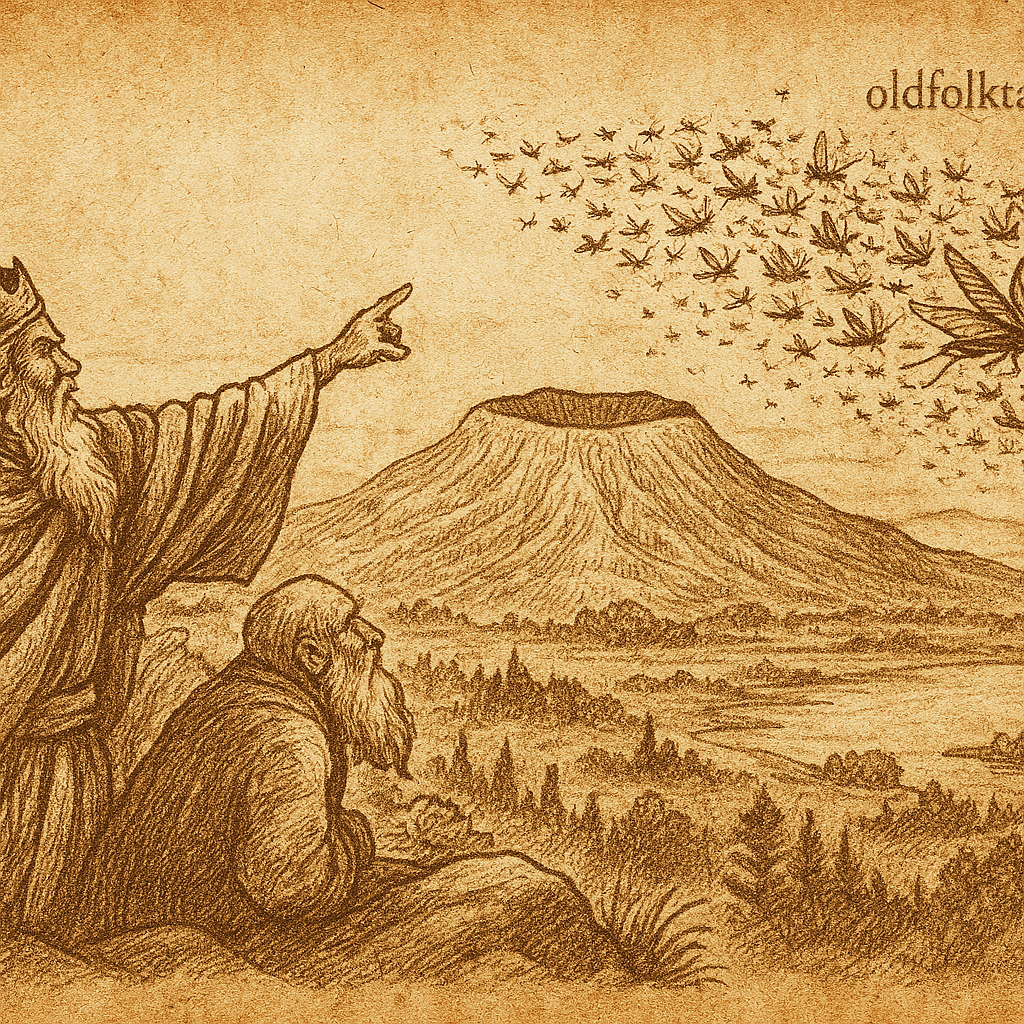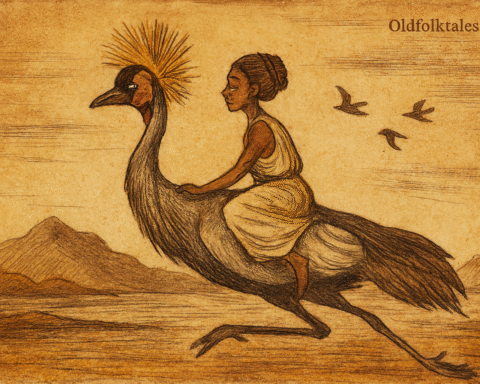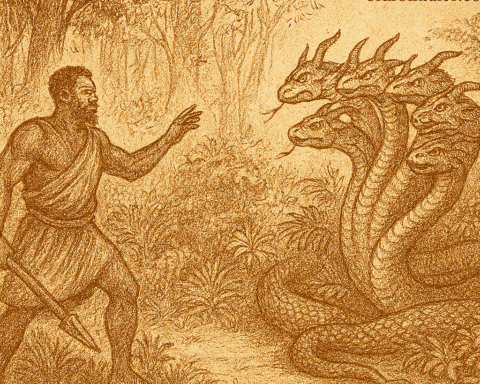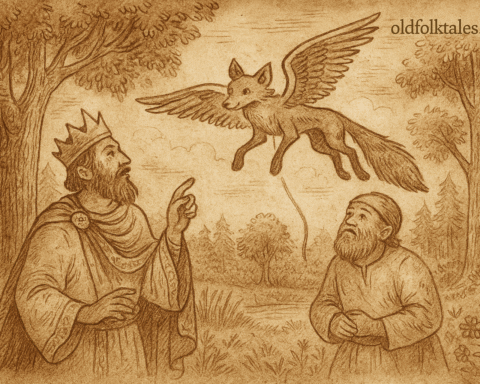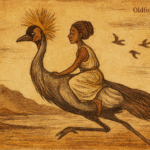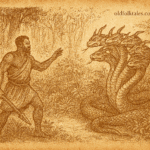Standing majestically all alone in the middle of a vast, rolling plain rises Mount Elgon, a sleeping giant whose presence dominates the landscape for miles in every direction. This ancient mountain holds secrets in its depths, for long ago Mount Elgon was a fearsome volcano that spewed fire and molten rock across the land. At its summit lies a massive crater, so wide that it stretches eight miles from rim to rim, a testament to the tremendous forces that once shaped this corner of Uganda.
In the days when the world was younger and magic flowed more freely through the African highlands, a mischievous young wizard made his home upon Mount Elgon’s towering peak. This wizard, drunk with the power of youth and delighting in chaos, would stir up the volcanic fires deep within the crater until brilliant flames leaped skyward like angry spirits dancing against the stars. The sight was both magnificent and terrifying, illuminating the night sky with an otherworldly glow that could be seen from countless villages scattered across the plains below.
When the people living in the fertile valleys and rolling grasslands witnessed these supernatural displays, fear would grip their hearts like an icy hand. They would abandon their homes and flee in terror, their cattle lowing in confusion and their children crying as families scattered across the landscape seeking safety. The young wizard, delighting in the panic he had created, would hurl enormous rocks after the fleeing people, some boulders as large as entire houses tumbling through the air with thunderous crashes. These massive stones can still be seen today, lying scattered across the plains like the abandoned toys of some gigantic child, silent witnesses to the wizard’s youthful cruelty.
Also read: The Story of the Fairy Foxes
But as the seasons turned and years passed like flowing water, the wizard’s heart began to change. Age brought wisdom, and with wisdom came compassion. The wild recklessness of youth gradually gave way to a gentler nature, and the reformed wizard ceased his rock-throwing games. He allowed the volcanic fires to die down to mere whispers, leaving just enough heat to create occasional puffs of steam that rose from the crater like the breath of a sleeping dragon, harmless but reminding all who saw it of the power that lay dormant beneath.
Seeing that the mountain had grown peaceful, the people cautiously returned to its beautiful green slopes. They built their homes among the fertile soil and terraced gardens, planted crops that flourished in the rich volcanic earth, and found happiness in the shadow of the now-benevolent mountain. The wizard, content in his newfound role as protector rather than tormentor, sat peacefully upon his mountain throne and watched over the land with satisfaction.
One fateful day, the people of Uganda heard a sound unlike any they had experienced before, a strange rumbling that resembled a distant storm, yet carried an ominous quality that made their skin crawl with unease. Looking toward the horizon, they saw a great black cloud moving swiftly across the sky, but this was no ordinary weather formation. The cloud writhed and shifted in ways that defied the natural patterns of wind and rain, and its approach filled the air with an electric tension.
Families rushed from their houses, shading their eyes against the sun as they stared at the approaching phenomenon. The elderly, wise in the ways of the land and its dangers, recognized the threat immediately. “This is no storm,” they declared with grim certainty, their weathered faces etched with concern. “It is a flight of locusts.”
The locusts descended upon Uganda like a living plague, settling on every green thing with voracious hunger. Their wings created a deafening buzz that drowned out all other sounds, and their countless bodies darkened the very ground they covered. From province to province they moved in their relentless feast, devouring crops, stripping trees bare, and consuming every blade of grass until the once-verdant landscape lay brown and barren. The devastation was complete and heartbreaking where lush fields had waved in the breeze, only bare earth remained.
When the wizard of Mount Elgon gazed out over his beloved land and witnessed the terrible destruction the locusts had wrought, righteous anger blazed in his ancient heart like the volcanic fires of his youth. The people who had returned to trust him were suffering, and he would not stand idle while their homes and livelihoods were destroyed.
With swift purpose, the mountain wizard summoned a hornet, one of his faithful messengers, and entrusted it with an urgent communication for the wizard of the Sesse Islands, who dwelt far out on the waters of the Great Lake. “Tell my brother wizard of this catastrophe,” the mountain wizard commanded, his voice carrying the weight of authority earned through centuries of power. “If he can persuade these locusts to fly over the Great Lake, I will raise such a hurricane as has never been seen and blow every last one of them into the water where they belong.”
The hornet, swift as an arrow and dedicated to its master’s will, raced across the vast expanse of water to the mysterious Sesse Islands, where the lake wizard held dominion over the aquatic realm. When this wizard heard the hornet’s message and learned of the locusts’ devastation, his own anger matched that of his mountain counterpart. Without hesitation, he sent the hornet back with his reply: “Tell the mountain wizard to prepare his hurricane for tomorrow’s dawn. The locusts will fly over the water, and we shall end their reign of destruction.”
As the sun began to set, painting the sky in brilliant shades of orange and purple, the lake wizard called together all the fireflies within his domain. These tiny creatures of light, loyal to their magical master, gathered in glowing clouds that sparkled like stars come down to earth.
“Go to the mainland,” the wizard instructed them, his voice gentle but filled with purpose. “While the locusts rest upon the ground through the night, sing to them and dance among them. Persuade them with your songs to cross the Great Lake, for there lies their doom.”
The fireflies, understanding their crucial mission, flew across the water as darkness fell, their tiny lights twinkling like a constellation in flight. Throughout the long night, they wove in and out of the shadows where the locusts rested, their ethereal voices rising in harmonious song:
Over the water of sparkling blue,
Dancing in golden light,
Lie beautiful islands of every hue,
The Country of Heart’s Delight.
Deep, cool forests and crystal streams,
Fruit trees and fields of gold,
These are the islands of boyhood’s dreams,
Where no one ever grows old.
The locusts, having no king or leader to guide them with wisdom, listened to this enchanting melody with growing desire. They had never seen the true vastness of the Great Lake, a body of water so enormous that all of Scotland could fit within its borders, and in their simple minds, they believed the fireflies’ promises of paradise. Seeing only the nearby islands glimmering in the moonlight, they imagined countless more beautiful lands waiting beyond the horizon.
When dawn broke over the devastated landscape, the locusts rose from the ground in massive bands, their wings catching the morning light as they began their fateful journey across the water. They flew with eager anticipation toward what they believed would be the Country of Heart’s Delight, never suspecting the trap that awaited them.
The moment the locusts were committed to their flight over the open water, the wizard of Mount Elgon unleashed his carefully prepared hurricane. Winds of incredible force swept down from the mountain heights, churning the lake into towering waves and creating a tempest of such ferocity that the very air seemed to scream. The locusts, caught helplessly in the supernatural storm, were swept from the sky like leaves before a gale and plunged into the churning waters where they drowned by the millions.
For days afterward, the surface of the Great Lake was carpeted with the bodies of countless dead locusts, floating like a vast, dark stain upon the water. The sight served as a grim reminder of the power of nature and the wisdom of those who truly understood its ways.
Uganda was saved, its remaining green places protected from further devastation, and the land could begin to heal and flourish once again. The collaboration between the two powerful wizards had succeeded in preserving the kingdom for future generations.
This is why the old people of Uganda, those who remember the ancient stories and honor the traditional ways, still call the Great Lake by its true name: the Locust-Killer. However, the children of today learn to call it by the name written on modern maps Lake Victoria though they may never fully understand the deeper significance of the waters that stretch to every horizon.
The Moral Lesson
This powerful Ugandan folktale teaches us that cooperation and wisdom can overcome even the most devastating challenges. The story shows how reformed individuals can use their abilities for good, as seen in the mountain wizard’s transformation from destructive youth to protective elder. It also demonstrates that environmental threats require collective action and that sometimes deception is necessary to save the greater good. The tale reminds us that traditional knowledge and names often carry deeper meaning than their modern replacements.
Knowledge Check
Q1: How did the wizard of Mount Elgon change from his youth to his old age? A1: The wizard transformed from a mischievous youth who terrorized people by stirring volcanic fires and throwing massive rocks, to a kind, protective elder who let the fires die down and peacefully watched over the people who returned to live on his mountain.
Q2: What method did the lake wizard use to lure the locusts over the water? A2: The lake wizard sent fireflies to sing enchanting songs to the locusts all night, promising them a “Country of Heart’s Delight” with beautiful islands, cool forests, crystal streams, and fields of gold across the Great Lake.
Q3: Why were the locusts vulnerable to the wizards’ trap in this Ugandan folktale? A3: The locusts had no king to guide them with wisdom and didn’t understand how vast the Great Lake truly was. They were easily deceived by the fireflies’ songs because they could only see nearby islands and imagined more paradise lands beyond.
Q4: What does Mount Elgon’s transformation from active volcano to peaceful mountain represent? A4: Mount Elgon’s transformation symbolizes personal growth and redemption how individuals can change from destructive forces in their youth to protective, nurturing presences in their maturity through wisdom and compassion.
Q5: What is the significance of the two different names for the Great Lake in this story? A5: The traditional Ugandan name “Locust-Killer” preserves the memory of this legendary battle and the lake’s role in saving the land, while the modern name “Lake Victoria” represents how colonial influences replaced indigenous knowledge and storytelling traditions.
Q6: What does this Ugandan legend teach about environmental cooperation and protection? A6: The story demonstrates that protecting the environment from devastating threats requires cooperation between different powers and regions, and that sometimes creative solutions and strategic thinking are more effective than direct confrontation.
Source: Traditional Ugandan folktale from “The King of the Snakes, And Other Folk-Lore Stories from Uganda”
